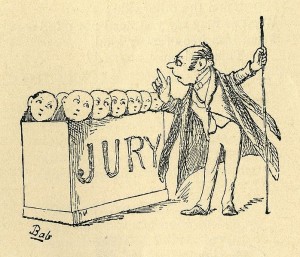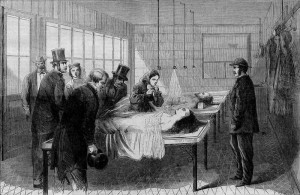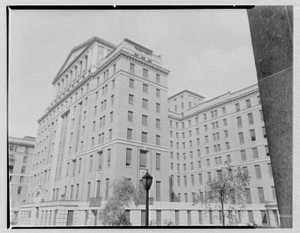If you were a patient at Bellevue Hospital in 1901, it was wise to finish your supper if the nurses ordered you to. That was the fatal lesson that patient Louis H. Hilliard may have learned. One thing for sure is that so-called “lunatics,” in general, take a beating in this jaw-dropping article from the March 1, 1901 issue of the Brooklyn Daily Eagle. An excerpt:
“The judge declined to find Jesse R. Davis, a Bellevue Hospital nurse, guilty of killing Louis H. Hilliard, a patient, in the hospital. Davis, with two other nurses, was charged, it will be remembered, with beating Hilliard brutally and strangling him with a sheet because he would not eat his supper. There is a widespread belief that the nurses in the charity hospitals are brutal and when Hilliard died and bruises were found on his body and one of the bones in his throat was broken, people were ready to believe that the attending nurses had killed him. The Grand Jury decided that the evidence against the nurses was sufficient to warrant charging them with the crime. But the trial jury, which heard both sides of the case and saw the witnesses for the defense and for the prosecution, concluded, as already intimated, that the crime had not been proved.
The case of the prosecution depended on the testimony of two lunatics and of a newspaper writer, who had feigned lunacy for the sake of getting inside of the hospital to gather material for a sensational article. He has made sensation enough, but the jury has decided that it is like most of the sensations created by newspapers which depart from the legitimate business of printing the news to the business of making it. Scandals manufactured to sell extra editions do not bear examination. The newspaper writer told two different stories of what happened in the hospital. They could not both be true. The jury concluded that it would not believe either. The lunatics who testified gave their evidence in a simple straightforward manner. Though it is unusual to admit such witnesses to the stand it is not unprecedented and the Supreme Court of the United States has held that they ought to be allowed to testify, for otherwise attendants of the insane might do anything they chose with those under their care and escape punishment if they did it when none but the lunatics was around. The testimony of such witnesses, however, has to be sifted by the jurors just as that of the sane witnesses.
 The Davis jurors did not believe what the lunatics swore to any more than they believed the man who had feigned insanity. Their action is not such as to encourage prosecuting officers to put lunatics on the stand. And this is fortunate, indeed. While the testimony of such people may be legally competent it ought not to be used save under such conditions as those which the Supreme Court has said justify recourse to it, namely, when none but lunatics have seen the things which it is desired to prove. And even then a jury ought to be warned by the court against a conviction on the uncorroborated testimony of those whose minds are diseased and who are not legally responsible for what they say and who may have no sense of moral accountability. The testimony of the lunatic is no better than uncorroborated circumstantial evidence, and should not be treated differently. The twelve sane men who tried Davis deserve the thanks of the community for declining to believe such testimony. And they deserve thanks, also, for refusing to believe that men in training for the care of the sick would kill a patient on no greater provocation than his refusal to eat his supper. There are many inhuman creatures in this city, but it is not credible that they are attendants in the hospitals. The nurses do use force in handling the insane. Indeed, they have to do it when the patients are violent, but it is incredible that Davis and two other Bellevue nurses are guilty as charged in the indictment. If it is necessary to call lunatics to make out a case against the other two nurses their trial might be better abandoned.”
The Davis jurors did not believe what the lunatics swore to any more than they believed the man who had feigned insanity. Their action is not such as to encourage prosecuting officers to put lunatics on the stand. And this is fortunate, indeed. While the testimony of such people may be legally competent it ought not to be used save under such conditions as those which the Supreme Court has said justify recourse to it, namely, when none but lunatics have seen the things which it is desired to prove. And even then a jury ought to be warned by the court against a conviction on the uncorroborated testimony of those whose minds are diseased and who are not legally responsible for what they say and who may have no sense of moral accountability. The testimony of the lunatic is no better than uncorroborated circumstantial evidence, and should not be treated differently. The twelve sane men who tried Davis deserve the thanks of the community for declining to believe such testimony. And they deserve thanks, also, for refusing to believe that men in training for the care of the sick would kill a patient on no greater provocation than his refusal to eat his supper. There are many inhuman creatures in this city, but it is not credible that they are attendants in the hospitals. The nurses do use force in handling the insane. Indeed, they have to do it when the patients are violent, but it is incredible that Davis and two other Bellevue nurses are guilty as charged in the indictment. If it is necessary to call lunatics to make out a case against the other two nurses their trial might be better abandoned.”
Tags: Jesse R. Davis, Louis H. Hilliard


